November 1, 2024 | 09:29 GMT +7
November 1, 2024 | 09:29 GMT +7
Hotline: 0913.378.918
November 1, 2024 | 09:29 GMT +7
Hotline: 0913.378.918
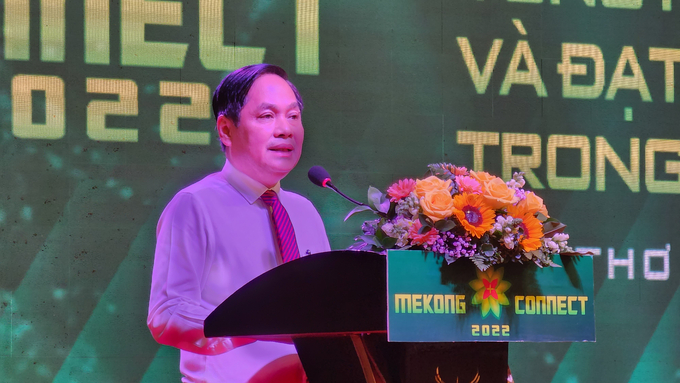
Mr. Nguyen Van Hong, Vice Chairman of Can Tho City People's Committee, believes that raw material areas in the Mekong Delta are currently unorganized and mismanaged, and the infrastructure is not limited. Photo: Kim Anh.
Raw material areas are regarded as the starting point and foundation for the development of sustainable value chains in the process of agricultural restructuring. In addition, a standardized and concentrated agricultural raw material area based on sustainable linkages with processing businesses, transporting service providers, domestic and foreign consumption markets is a necessary trend.
With the advantage of being a key agricultural production area in Vietnam, Can Tho city as well as other provinces in the Mekong Delta have introduced policies to build large-scale concentrated commodity agricultural areas and subsequently, multiple raw material areas have been formed.
However, according to Mr. Nguyen Van Hong, Vice Chairman of Can Tho City People's Committee at the Workshop "Building material areas that meet domestic and international market standards", within the framework of Mekong Connect Forum in 2022, these raw material areas are unorganized and mismanaged, and the infrastructure is limited. Moreover, the raw material area still lacks production data information to reliably perform product traceability, develop area codes for inter-regional goods in service of the processing and export industry. As a result, Mr. Hong believes that the formation and development of the standard raw material area is a necessary breakthrough, which can support the following stages in the value chain.
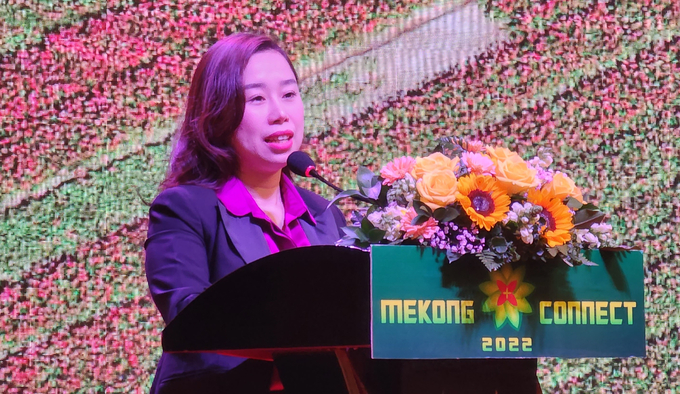
Ms. Ngo Tuong Vy, General Director of Chanh Thu Import-Export Group Joint Stock Company, said that regional linkages are essential in helping the Mekong Delta establish large raw material areas. Photo: Kim Anh.
The construction of standard raw material areas in Can Tho City is being promoted through the establishment of a Center for linkage, production, processing and consumption of agricultural products in the Mekong Delta. The center is one of the six important contents under Resolution No. 45/2022/QH15 on piloting a specific mechanisms and policies for the development of Can Tho City, which has been approved by the National Assembly on January 11, 2022.
The center is responsible for the research, development, convergence of advanced technology solutions for production, processing, consumption of agricultural products as well as transfer said solutions to production units in the area. This icon of science and technology in the Mekong Delta includes factories, high-tech agricultural product processing businesses. The Center will operate under the mechanism of intelligence to help increase added value and create refined products to improve the competitiveness of Vietnam's agricultural sector.
From a business perspective, Ms. Ngo Tuong Vy, General Director of Chanh Thu Import-Export Group Joint Stock Company, said that the company has faced countless difficulties in mobilizing farmers to build standard raw material areas. That is why regional linkage is essential to helping the Mekong Delta establish large raw material areas.
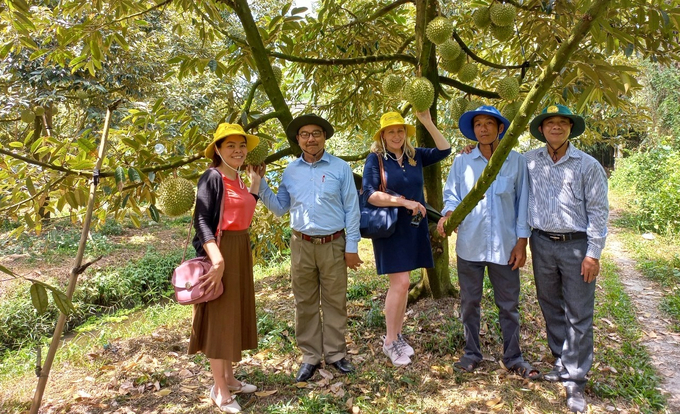
Vietnamese durian has been approved for officially export to the Chinese market, generating a driving force for the Mekong Delta to establish standard raw material areas. Photo: Kim Anh.
Farmers have started to gravitate towards joining cooperatives or cooperative groups to connect with businesses, and create stable output for their products. However, agricultural cooperatives are relatively lacking in experience as well as function to trade directly with businesses.
Chanh Thu Import-Export Group Joint Stock Company reported that the company can only meet 10 to 20% of the output according to the needs of customers. Businesses don't possess the capacity to build their own material areas, so they must make investments. Namely, the Company directly associates with cooperatives and cooperative groups to support farmers in technical and product purchasing organization. On the other hand, the Company also utilizes a team of traders to accompany cooperatives, and each raw material area will have a representative trader.
Vietnamese durian has been approved for officially export to the Chinese market, which has opened up great opportunities for farmers. “This is a signal that farmers have succeeded in building credibility and quality. China is a major market, and when other Vietnamese agricultural products are allowed for export this market, agricultural products from the Mekong Delta will be in great demand. With this goal in mind, farmers must be prepared, and regional linkages play a very important role", said Ms. Ngo Tuong Vy.
In order to establish a standard raw material area, a database for product traceability must implemented on a national level so that businesses can integrate. In addition, provinces in the Mekong Delta needs to manage traceability, build transparent material areas that meet the requirements of the import market, establish trust with consumers.
Translated by Nguyen Hai Long
/2024/10/29/1613-4-204527_140.jpg)
(VAN) Currently, a number of customers from India and Taiwan have come to learn and wish to import chayote from T&D Clean Agricultural Cooperative (Mu Cang Chai district).
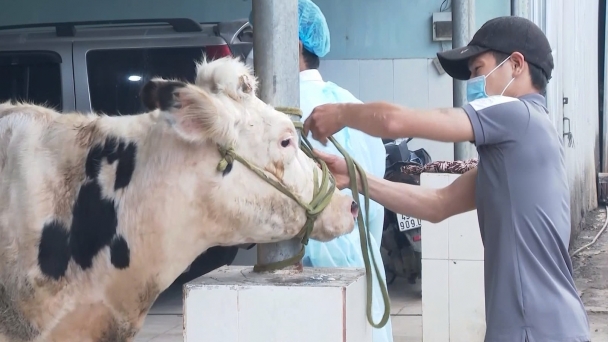
(VAN) Navetco has transferred 50% of the compensation (more than VND 10 billion to dairy farmers in Lam Dong who suffered losses due to diseases.
/2024/10/28/5341-00-nongnghiep-115337.jpg)
(VAN) As one of 63 outstanding Vietnamese farmers in 2024, Mr. Pham Thanh Loc successfully researched the Nano Emulsion technology process of mixing ginger essence and some herbs.
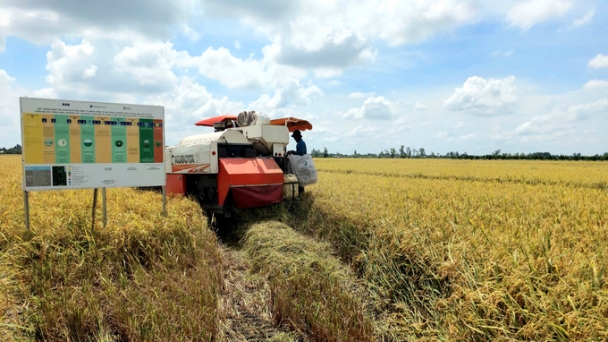
(VAN) Net Zero Carbon will utilize its technological solutions to support Hau Giang in reaching 46,000 hectares of high-quality rice by 2030.
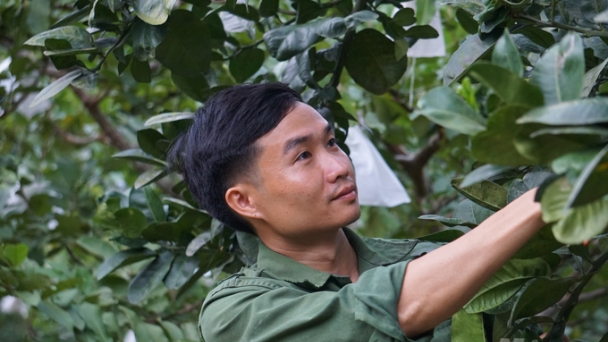
(VAN) Ngo Dinh Tuan's circular farm generates over 300 million VND in income annually. This young farmer has also effectively utilized social media to drive sales.
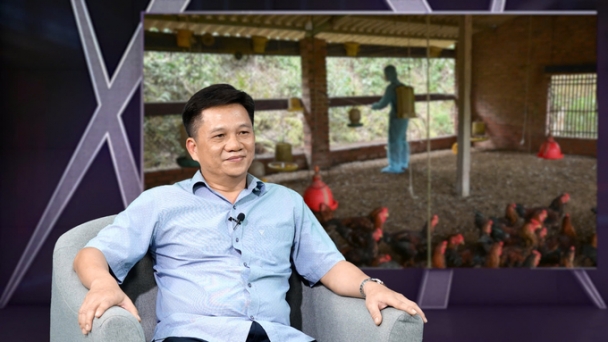
(VAN) Following Typhoon No. 3, agricultural extension agencies and businesses have implemented various solutions to help farmers restore production, with a focus on the livestock sector.
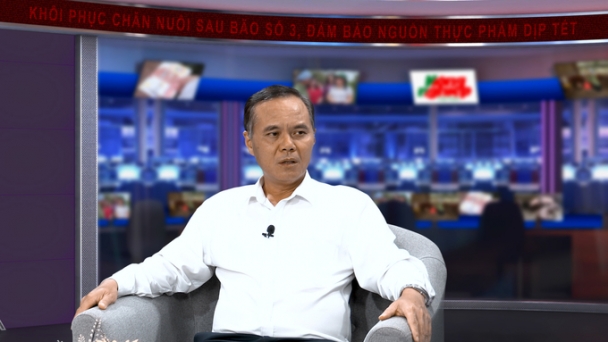
(VAN) Efforts to replenish herds, restore breeding stocks, and ensure biosecurity are key factors in securing adequate food supplies for the Lunar New Year holidays.